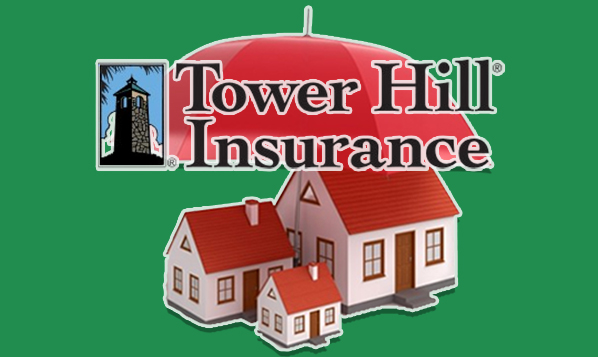Policyholders who reside in a high-risk region, have issues getting homeowners insurance and don’t mind the absence of a mobile app or potential customer service issues should seek Tower Hill. For almost 50 years, Tower Hill has offered adequate coverage solutions to Florida homeowners customized to specific legal and environmental requirements.

Tower Hill Homeowners Insurance offers both commercial property and residential coverage with certain considerations when providing a homeowners insurance policy. A strong reputation for dependability and customer service supports this. Furthermore, you can understand more about Tower Hill Homeowners Insurance by reading this article.
Tower Hill Homeowners Insurance Coverage Types
Tower Hill Homeowners Insurance provides every common coverage that a homeowner in Florida would require from an insurance provider. Additionally, as it offers extended restrictions for homeowners of high-value properties, it also provides various less common coverage options to cover your assets.
High-value home coverage
Tower Hill offers high-value home insurance for homes valued between $750,000 and $5 million, often in desirable areas or with amenities like a private tennis court or pool. The company offers two upscale tiers: Prime Plus and Spire, with Spire offering more extras and add-ons. These policies have coverage levels higher than typical homes, with notable coverage choices that significantly increase the limits accessible to most homeowners.
Standard homeowners insurance
The physical structure of your house, any other buildings on your land, your personal belongings, and the costs incurred should a covered loss render your houses uninhabitable are all covered under this package. Additionally, it is the cornerstone of Tower Hill’s portfolio of home insurance products
Expanded reach via endorsements
Tower Hill enables homeowners to add endorsements to their policies that address risks such as fraud, water backup problems, and power outages. Their insurance policies gain a great deal of value from this flexibility, which also helps customize coverage to fit unique risk profiles.
Commercial property insurance
This package, which is intended for Florida business owners, offers protection for commercial buildings and their belongings. To address particular risks related to business owners, coverage can be tailored with different endorsements, providing comprehensive protection against possible financial losses from property damage or business interruptions.
Advantages and Disadvantages of Tower Hill Homeowners Insurance
While state-by-state variations exist in Tower Hill’s coverage offerings, the company allows homeowners to customize their home insurance policies. It’s beneficial to consider the advantages and disadvantages of each insurance company when researching them. When considering Tower Hill, note the following points.
Advantages
- Many endorsement choices, including water backup coverage and extended replacement cost.
- Flood insurance is offered as a stand-alone policy or as an endorsement, depending on the provider.
- Exchange policyholders may receive a portion of the profits from underwriting.
Disadvantages
- Restricted types of homeowner’s insurance outside of Florida.
- No insurance mobile app and limited online capabilities.
- An abnormally high volume of grievances from clients to the National Association of Insurance Commissioners (NAIC).
What Does Tower Hill Homeowners Insurance Not Cover
In addition, not all kinds of damage are covered by Tower Hill home insurance. Usually, home insurance excludes:
- Damage resulting from carelessness or poor maintenance.
- Water damage, but you can buy separate flood insurance from Tower Hill, another private insurer, or the NFIP.
- Governmental action like seizure of property.
- Deliberate harm.
- Danger from nuclear energy.
- Ordinance or legislation, such as when the government mandates that you tear down, rebuild, remodel, or fix your house.
- War.
How Much Does Tower Hill Homeowners Insurance Cost
Generally, the average monthly premium for a Tower Hill home policy is $59 for $200,000 in dwelling coverage, $95 for $350,000 in dwelling coverage, and $127 for $500,000 in dwelling coverage. When determining rates, home insurance companies consider several factors, such as:
- The place where you reside.
- The age of your house and the materials used in its construction.
- Both the history of your home’s claims and your own.
- The price of rebuilding the home.
- The proximity of a fire hydrant or other water source, with the fire department, are factor in determining your home’s fire rating.
- The amount you deduct.
- Your credit history, which Massachusetts, Maryland, and California prohibit.
How to Get Homeowners Insurance from Tower Hill
Tower Hill Homeowners Insurance offers home insurance quotes on its website.
- In the quote tool located on the homepage, enter your ZIP code.
- Select “Get a Quote.”
- Put your address in here.
- Give the desired level of coverage. Verify the coverage amount of your current policy if you’re changing providers.
- Selecting the building materials for the house, such as masonry, frame, and fire-retardant materials, can affect the cost of insurance.
- Enter the building year of your house.
- Tell us if your roof has been replaced and what year it was done.
- Tower Hill will use that information to provide you with a quote for your homeowners’ insurance or to contact you through phone or email.
To obtain additional coverage for valuable items, you can add scheduled personal property to your home insurance policy as an optional add-on. Furthermore, working with an insurance agent can help you determine the exact amount of coverage you require.
Is Tower Hill Homeowners Insurance a Good Company
In Florida, Tower Hill Homeowners Insurance is a good choice for individuals looking for affordable house insurance. Additionally, they have minimal NAIC complaints, a strong Demotech financial rating, indicating the ability to pay claims, and flood coverage that surpasses NFIP coverage. They don’t offer auto insurance, so those looking to combine home and auto policies should look elsewhere. Although they claim to operate in 17 states, their website doesn’t specify which states they presently service.

